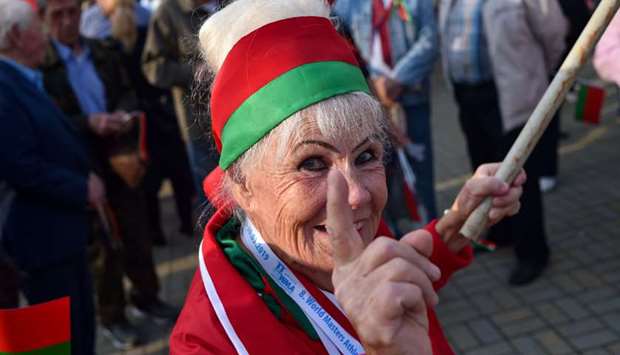Two leading members of a newly formed opposition council in Belarus were questioned yesterday in a criminal case over what President Alexander Lukashenko calls an attempt to seize power, after nearly two weeks of mass rallies against his 26-year rule.
More public figures, including an Olympic athlete, came out in opposition to Lukashenko, whose political challengers say he rigged an August 9 election.
In the latest act of protest, the streets of the capital Minsk were paralysed yesterday by a motorists’ strike, with hundreds of drivers honking horns and abruptly abandoning cars in traffic.
The loosening of Lukashenko’s grip poses a challenge both for the Kremlin, determined to keep its sway over its most loyal neighbour, and the West, which is sympathetic to a nascent pro-democracy movement but wary of provoking Russian intervention.
Two sources close to the Kremlin told Reuters that President Vladimir Putin believes Lukashenko will probably cling to power for now, and is content to let him sweat it out.
Lukashenko, who has repeatedly vowed to crush the unrest, said the crisis would end soon.
“This is my problem, which I should resolve, and we are resolving it,” he told workers at a state food factory named after the founder of the Soviet KGB. “And believe me, in the coming days it will be resolved.”
In a sign of his dependence on Moscow, Lukashenko also confirmed for the first time that journalists had been brought from Russia to staff state TV, where workers abruptly quit last week in protest against what they described as orders to broadcast propaganda.
Two leading members of the opposition Co-ordinating Council, Maksim Znak and Sarhey Dyleuski, were accompanied by dozens of supporters as they arrived for questioning at the headquarters of the Investigative Committee in a criminal case accusing the council of trying to seize power.
Znak, a lawyer, said on entering that he feared he might be arrested.
But when he emerged later, he said he had “productive discussions” and would get back to work.
The council was launched this week with the self-described aim of negotiating a transfer of power.
It includes an array of public figures, among them a Nobel Prize-winning author and the ousted head of the country’s main drama theatre.
A police crackdown does not seem to have intimidated the protesters and opposition has spread to include strikes at state factories long seen as bastions of support for Lukashenko.
Thousands turned out yesterday, and much larger protests are expected over the weekend.
“I couldn’t sit at home,” said Tatyana, 45, a medic. “I am not afraid. If you stay home, that means you have to live your whole life in fear.”
Lukashenko’s main opponent, Sviatlana Tsikhanouskaya, has fled to neighbouring Lithuania, where she has released a steady stream of video messages calling on her followers to rise up peacefully.
Yesterday she called for more workers to strike.
At her first public news conference since going into exile, the 37-year-old political novice noted that Moscow had not made contact.

A woman attends a rally in Minsk in support of Belarusian President Lukashenko.
